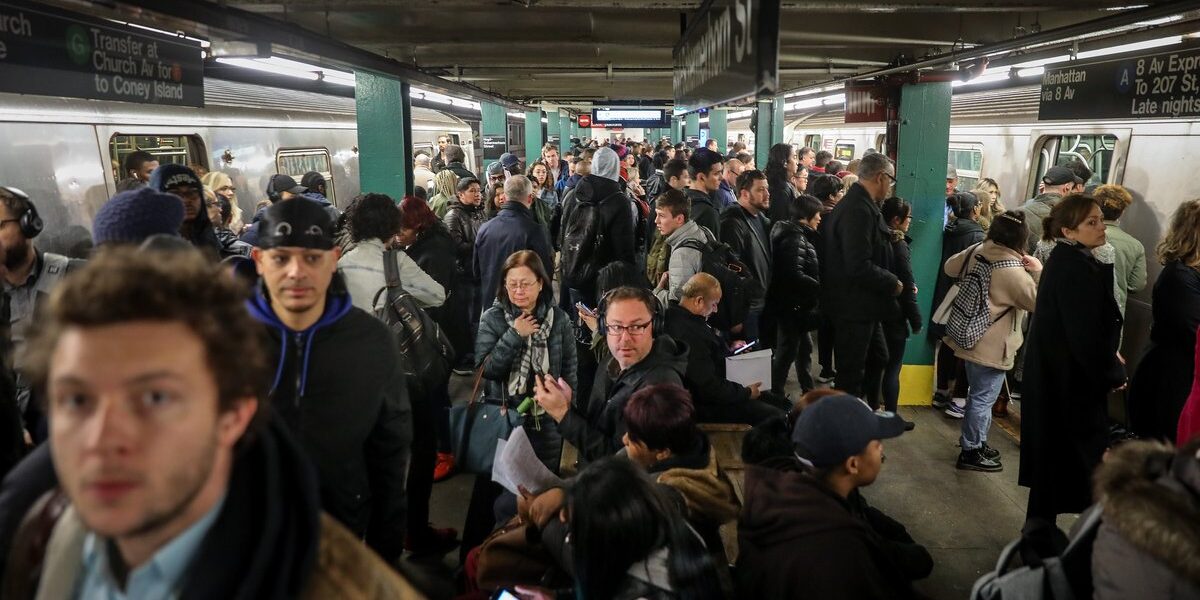Delays are on the rise in New York City’s subway system — and aging infrastructure that was set to be upgraded with money from MTA’s stalled congestion pricing program is to blame.
More than 137,000 weekday subway trains were delayed during the first four months of the year, a 30% increase from the same period of 2023, MTA data shows.
The bulk of the delays — nearly 42,000 of them — over that period were caused by “infrastructure and equipment” issues. And the data shows there are growing problems with the subway’s signal system, which directs trains along the tracks. Signal problems were cited for 14,339 weekday train delays from January through April, a 57% increase from last year.
The drop in subway reliability comes as Gov. Kathy Hochul halted the implementation of congestion pricing. The plan, which was set to begin June 30, would have tolled drivers a base fare of $15 to enter Manhattan below 60th Street. The money from those tolls would have been used to fund $15 billion in mass transit upgrades.
The F and the N lines saw the most delays caused by signal problems. MTA officials earlier this year halted a contract to modernize the signaling system on the F line along Sixth Avenue in Manhattan, saying they needed congestion pricing money to pay for the work. Transit officials have also pitched upgrades to the signals along the N line in Astoria, but haven’t passed a funding plan to cover the work.
The need to modernize subway signal systems — some of which rely on 90-year-old equipment — was a primary reason cited by state lawmakers when they passed legislation implementing congestion pricing in 2019. Officials touted signal system upgrades as a way to make commutes faster and more reliable.
Chair Janno Lieber said Monday that he expects the agency’s construction plans, known as the capital program, will “shrink.” The purchase of electric buses and upgrades to make stations more accessible to people with disabilities will likely be tabled in favor of maintaining the system.
“We got a tall order,” said Lieber. “We’re behind the 8-ball right now and that’s why we’re taking these, frankly, very serious steps to carve up the capital program and make sure we don’t let the system fall into disrepair, back into the 70s and 80s.”
MTA representatives did not respond to questions about the rise in subway delays.
Hochul, meanwhile, emphasized that the MTA’s budget was not in imminent danger, and that she just needed time to figure things out.
“To assume that the only funding source had to be congestion pricing shows a lack of imagination about understanding other opportunities to fund these projects,” she told reporters at an unrelated press conference at Bronx Borough Hall.
“There is no lack of imagination here, because we will find a funding source.”
Riders, meanwhile, are sick of waiting on subway platforms.
“I’m always late for everything. And I get anxiety just waiting,” Rosemarie Delgado, 42, from the Bronx said, on an F train platform at Jay Street in Brooklyn. Delgado commutes to the borough from the Bronx for appointments.
George Ramirez, an ironworker from Astoria, Queens, said he relies on the N train to get him to work sites early in the morning.
“If I miss one train, I’m late, and I’m f—d,” Ramirez, 32, said on a recent afternoon in Midtown Manhattan. “I’d say three out of five times every three weeks [it happens]…very unreliable.”
Upgraded signals can have a big impact on commutes. The MTA has over the last decade installed a modern system called “communication-based train control” on the L and 7 lines, which uses a computer system to automatically drive trains and prevent them from crashing.
MTA data shows about 90% of the trains on those lines ran on time during the first four months of the year, compared to an on-time performance rate of about 80% for the subway system as a whole.
“The creaking subway system has suffered close to a century of deferred maintenance, and with each passing year, it gets more challenging,” said Danny Pearlstein, a spokesperson for the advocacy group Riders Alliance. “We need major overhauls of critical systems like our signals, funded by congestion pricing, to deliver the modern, reliable subway New Yorkers deserve.”




